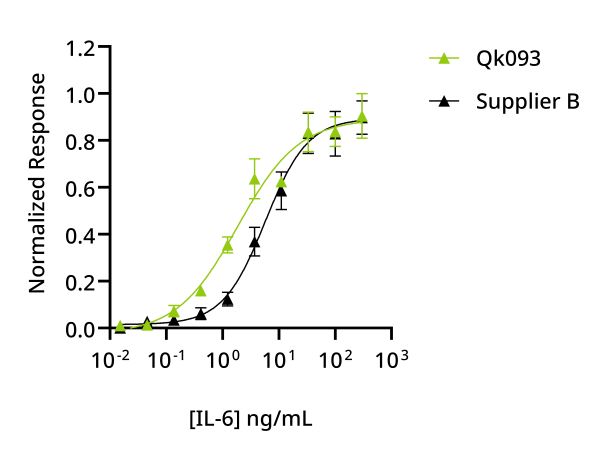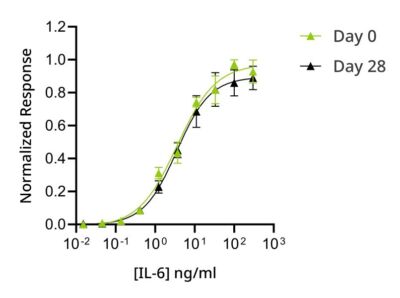Activin A
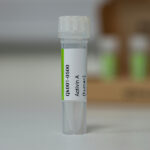
Comparison of activin A (Qk001) vial recovery from Qkine and alternative suppliers
Protein recovery yields ranged from 50% – 135% across 8 samples of activin A provided by different suppliers. The wide variation in yields highlights the importance of measuring vial recovery as part of a standard QC process. Qkine maintains an industry-leading vial recovery standard in the range of 95-115%.
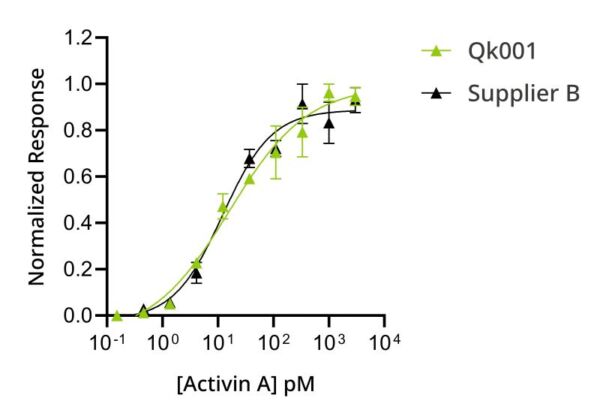
Qkine activin A (Qk001) is as biologically active as a comparable alternative supplier protein
Activin A is frequently used to maintain pluripotency in induced pluripotent and embryonic stem cell cultures. It is also used in many stem cell differentiation protocols, including endoderm lineage differentiation and further maturation into hepatocyte and pancreatic cells. Qkine activin A (Qk001) has equivalent bioactivity to activin A from an alternative major supplier.
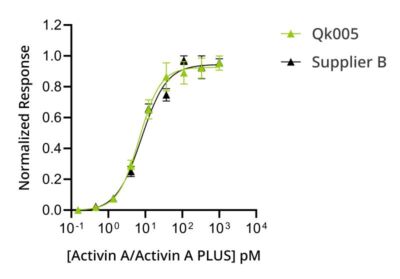
Qkine activin A PLUS (Qk005) is as biologically active as activin A protein from an alternative supplier
Human recombinant activin A PLUS protein is an optimized biologically active truncation of the mature domain of human activin A protein. The EC50 and activity in stem cell culture of activin A PLUS is equivalent to the full mature domain activin A. Qkine activin A PLUS (Qk005) has equivalent bioactivity to activin A from an alternative major supplier.
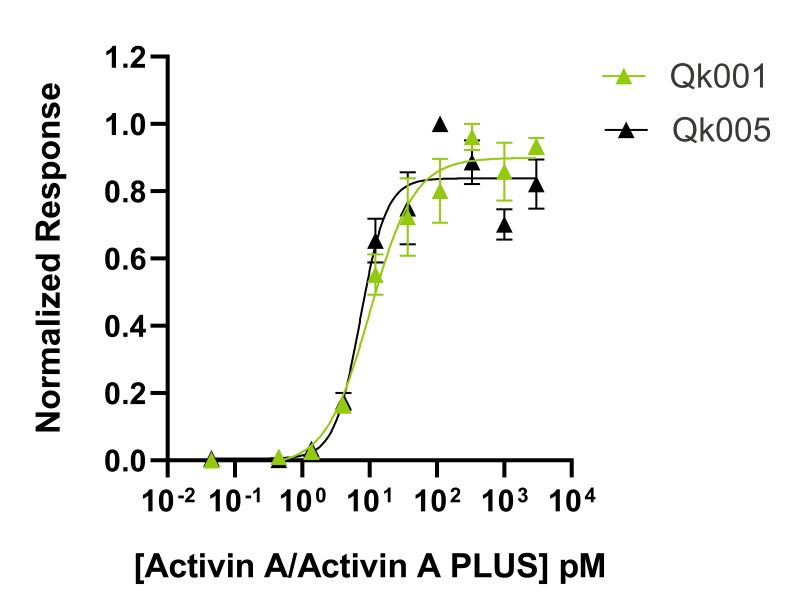
Activin A (Qk001) is frequently used to maintain pluripotency in induced pluripotent and embryonic stem cell cultures. It is also used in many stem cell differentiation protocols, including endoderm lineage differentiation and further maturation into hepatocyte and pancreatic cells. Human recombinant activin A PLUS protein (Qk005) is an optimized biologically active truncation of the mature domain of human activin A protein designed to be manufactured at scale for cost-effective, large-scale stem cell culture applications. The EC50 and activity in stem cell culture of activin A PLUS is equivalent to the full mature domain activin A.
BMP-2
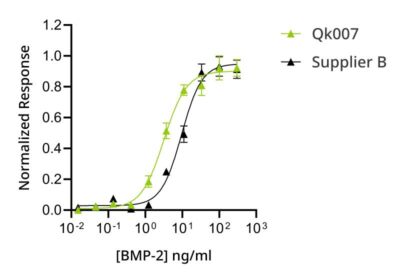
Qkine bone morphogenetic protein 2 (BMP-2, Qk007) has higher bioactivity than BMP-2 from an alternative supplier
Human bone morphogenetic protein 2 (BMP-2) is a key regulator of embryogenesis and supports the differentiation of induced pluripotent stem cells (iPSC) and embryonic stem cells (ECS). BMP-2 plays roles in the differentiation of mesenchymal cells to adipocytes, epithelial cancer EMT, chondrogenesis and regulation of neuronal and glial cell development. Qkine BMP-2 (Qk007) has high bioactivity, allowing lower concentrations to be used in media for cost-effective cell culture.
BMP-4

Qkine BMP-4 (Qk038) protein has higher bioactivity than bacterial and mammalian-expressed BMP-4 from alternative suppliers
BMP-4 is part of the TGF-β superfamily and has a complex biochemical structure, expertise is required to manufacture bioactive BMP-4. Qkine BMP-4 had higher bioactivity than BMP-4 from alternative suppliers, allowing lower concentrations to be used in media for cost-effective cell culture.
CNTF
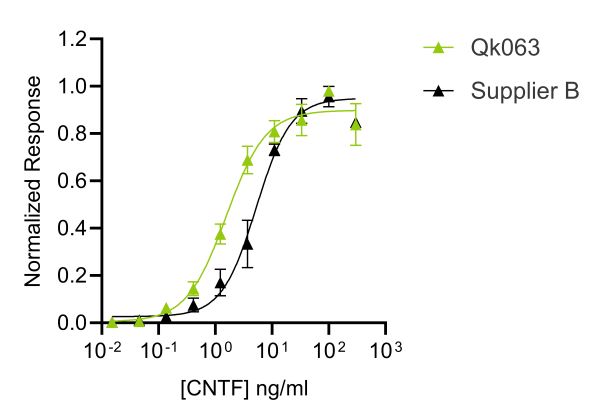
Qkine CNTF (Qk063) is more biologically active than a comparable alternative supplier protein
CNTF protein plays a crucial role in regulating the development of the nervous system and is involved in the differentiation and maintenance of various neurons, glial cells, and retinal cells. Qkine CNTF (Qk063) had higher bioactivity than CNTF from an alternative major supplier.
DKK-1
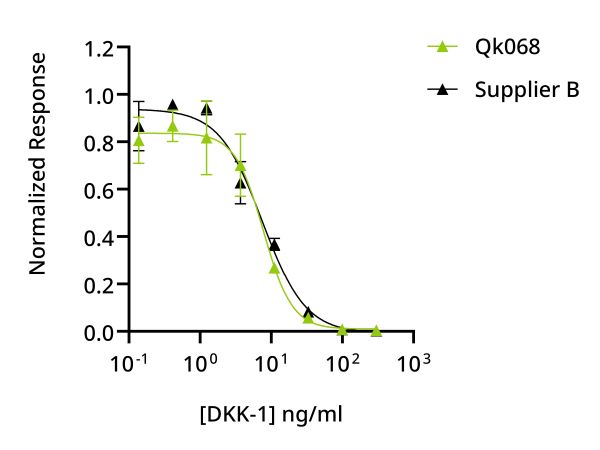
The only commercially available animal-free bioactive DKK-1 for reproducible stem cell culture and related applications
Dickkopf-related protein 1 (DKK-1) is a potent Wnt pathway antagonist used to control cell fate, self-renewal, and differentiation. Qkine DKK-1 (Qk068) has equivalent bioactivity to the mammalian-expressed DKK-1 from an alternative major supplier.
EGF
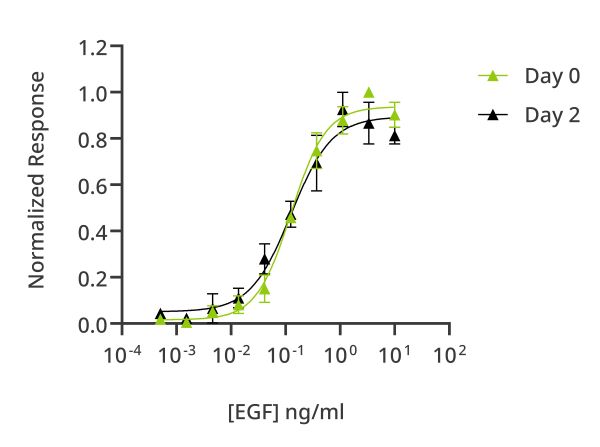
Epidermal Growth Factor (Qk011) remains stable and bioactive in conditioned media
In stem cell cultures, the instability of growth factors like EGF contribute to the need for frequent media changes to avoid spontaneous differentiation and variability. The half-life of EGF in conditioned media is believed to be between 1-3 days. Qkine EGF (Qk011) has been tested to ensure its stability in conditioned media.
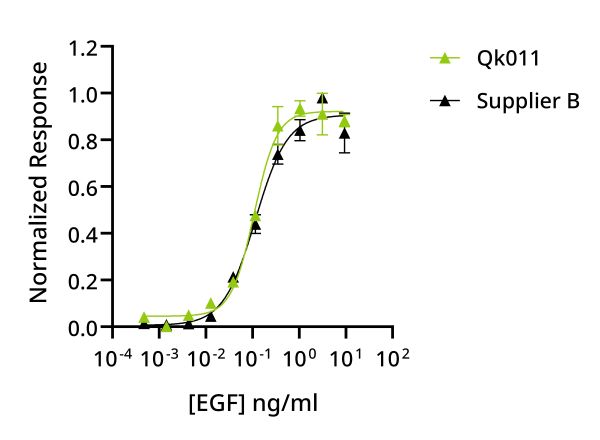
Qkine epidermal growth factor (EGF, Qk011) is as biologically active as the comparable alternative supplier B protein
EGF is an essential growth factor for stimulating the proliferation of induced pluripotent stem cells (iPSC) and embryonic stem cells (ESC) and their subsequent differentiation. EGF is also a key component of many media for developing and maintaining organoids. Qkine EGF (Qk011) has equivalent bioactivity to EGF from an alternative major supplier.

Qkine epidermal growth factor (EGF, Qk011) is as biologically active as the comparable alternative supplier F protein
EGF is an essential growth factor for stimulating the proliferation of induced pluripotent stem cells (iPSC) and embryonic stem cells (ESC) and their subsequent differentiation. EGF is also a key component of many media for developing and maintaining organoids. Qkine EGF (Qk011) has equivalent bioactivity to EGF from an alternative major supplier.
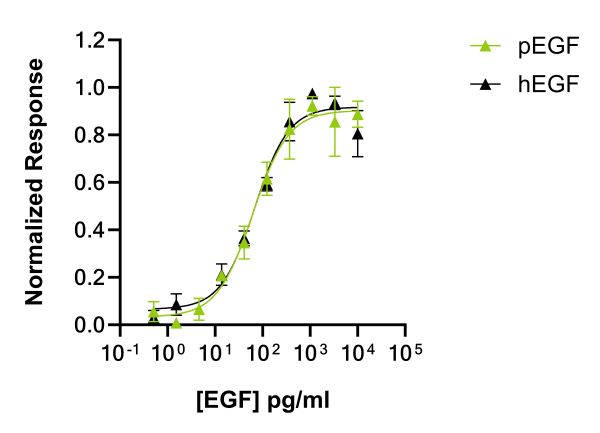
Species-specific growth factors such as porcine EGF (pEGF) are essential for the development and maintenance of animal cell lines and cellular agriculture. When tested Qkine pEGF was as biologically active as human EGF.
FGF-1
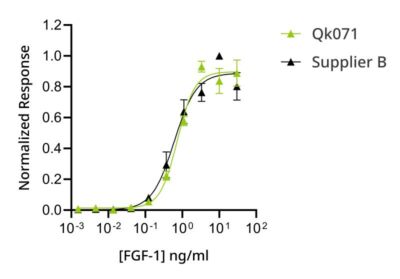
Qkine Fibroblast Growth Factor 1 (FGF-1, Qk071) is as biologically active as a comparable alternative supplier protein
Fibroblast Growth Factor 1 (FGF-1) can stimulate growth and differentiation of endothelial and epithelial cells and the development of organoids. FGF-1 can also be used for the maintenance of oligodendrocytes and astroglia as well as bone marrow-derived mesenchymal and hematopoietic stem cells. Qkine FGF-1 (Qk071) had equivalent bioactivity to the FGF-1 from an alternative major supplier.
FGF-2
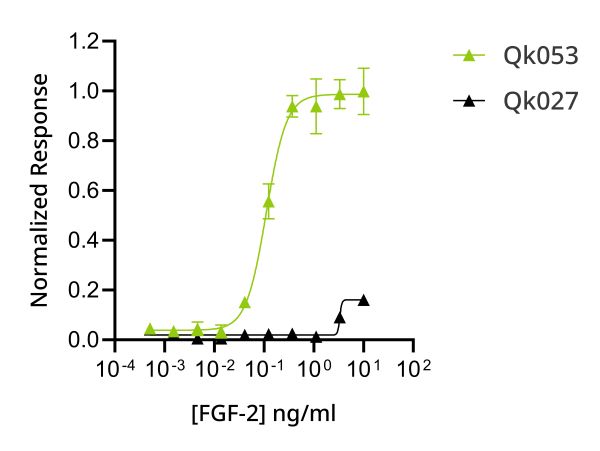
Thermostable FGF2-G3 protein (Qk053) remains stable and highly bioactive in culture
Qkine FGF2-G3 (Qk053) was engineered with nine amino acid substitutions to stabilize its structure and expressed in E. coli creating the only animal-free, protein-tag-free stabilized FGF2-G3 available commercially. The enhanced stability makes FGF2-G3 a highly bioactive and thermostable (heat stable) engineered form of FGF-2, resulting in improved culture conditions with less frequent media changes.
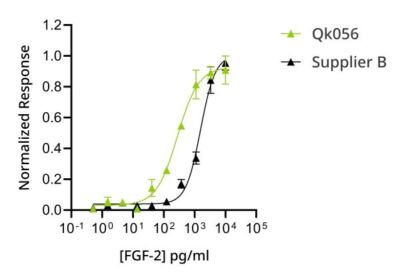
Qkine bovine/porcine fibroblast growth factor 2 (FGF-2) 154 aa protein (Qk056) is more biologically active than a comparable alternative supplier protein
Recombinant bovine/porcine FGF-2 protein 154 aa (bFGF/basic FGF), this is the long form of FGF-2 used for the development of optimized serum-free culture media for species-specific bovine (cow) and porcine (pig) cultivated meat and veterinary research applications. Qkine bovine/porcine FGF-2 (Qk056) was found to be more bioactive than an alternative major supplier.
FGF-4

Qkine human fibroblast growth factor 4 (FGF-4, Qk004) bioactivity is comparable to an alternative supplier protein
FGF-4 is used for the proliferation and differentiation of embryonic stem cells (ESC) and induced-pluripotent stem cells (iPSC) and promotes neural stem cell (NSC) proliferation. The comparative bioactivity data demonstrated that Qkine FGF-4 (Qk004) had comparable bioactivity FGF-4 from an alternative major supplier.
KGF/FGF-7

Qkine keratinocyte growth factor (KGF)/fibroblast growth factor 7 (FGF-7) bioactivity is comparable to an alternative supplier protein
Human KGF (FGF-7) protein is a member of the FGF family. KGF protein is used in the culture of lung, breast, liver, and bladder organoids. The comparative bioactivity data demonstrated that Qkine FGF-7 (Qk046) had comparable bioactivity FGF-4 from an alternative major supplier.
FGF-8a

Qkine animal origin-free Fibroblast Growth Factor 8a (Qk059) is more biologically active than mammalian-origin comparable alternative
FGF-8a plays a crucial role in regulating embryonic development and is involved in the proliferation, differentiation, and migration of induced pluripotent stem cells (iPSC), embryonic stem cells (ESC), and neural stem cells (NSC). The comparative bioactivity data demonstrated that Qkine FGF-8a (Qk059) had equivalent bioactivity to the mammalian-expressed FGF-8a from an alternative major supplier.
FGF-8b
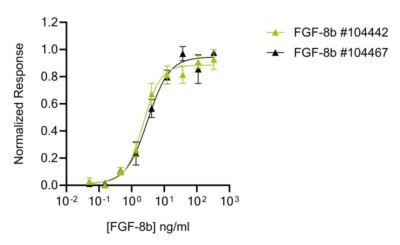
Qkine animal origin-free Fibroblast Growth Factor 8b (Qk057) produces consistently high bioactivity lot-to-lot
FGF-8b is involved in the regulation of embryogenesis and is commonly used for the differentiation of induced pluripotent stem cells (iPSC) into neural cell types and for brain organoid cultures. Qkine recombinant human FGF-8b lots tested showed a very narrow bioactivity range of 0.1-0.13 pM.

Qkine animal origin-free Fibroblast Growth Factor 8b (Qk057) bioactivity is comparable to an alternative supplier protein
FGF-8b is involved in the regulation of embryogenesis and is commonly used for the differentiation of induced pluripotent stem cells (iPSC) into neural cell types and for brain organoid cultures. Qkine recombinant human FGF-8b (Qk057) had comparable bioactivity to an alternative supplier protein.
FGF-9
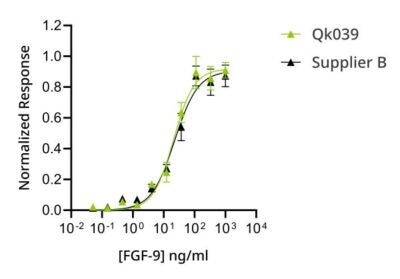
Qkine human fibroblast growth factor 9 (FGF-9, Qk039) bioactivity is comparable to an alternative supplier protein
FGF-9 is involved in many developmental processes including neural and skeletal development. Recombinant FGF-9 is frequently used in the generation of kidney organoids. Qkine FGF-9 (Qk039) has equivalent bioactivity to FGF-9 from an alternative major supplier.
FGF-10

Qkine human/rat/porcine/bovine Fibroblast Growth Factor-10 (Qk003) is as biologically active as a comparable alternative supplier protein
Fibroblast growth factor 10 (FGF-10) is involved in several different embryo and adult cell and tissue types, including mesenchymal, neuronal and epithelial cells. FGF-10 is used widely for stimulating the differentiation of induced pluripotent stem cells (iPSC) and embryonic stem cells (ESC) and promoting organoid formation. Qkine FGF-10 (Qk003) has equivalent bioactivity to FGF-10 from an alternative major supplier.
FGF-18
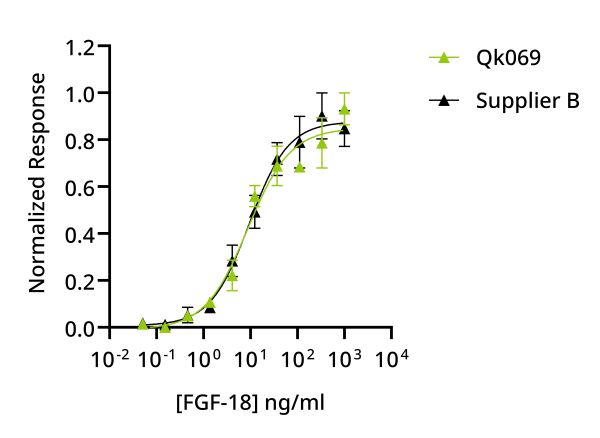
Qkine human Fibroblast Growth Factor-18 (Qk069) is as biologically active as a comparable alternative supplier protein
FGF-18 is widely used to support cell culture maintenance and proliferation, promote chondrogenic and osteogenic differentiation of stem cells and stimulate angiogenesis. Qkine FGF-18 (Qk069) has equivalent bioactivity to FGF-18 from an alternative major supplier.
Flt3L

Qkine recombinant human Flt3L (Qk087) is as biologically active as a comparable alternative supplier protein
Fms-like tyrosine kinase 3 ligand (Flt-3 Ligand or Flt3L) is a cytokine that is involved in the regulation of hematopoiesis. It stimulates the survival, proliferation, and differentiation of various early myeloid and lymphoid progenitor cells. Qkine Flt3L (Qk087) had equivalent bioactivity to Flt3L from an alternative major supplier.
GDF-5
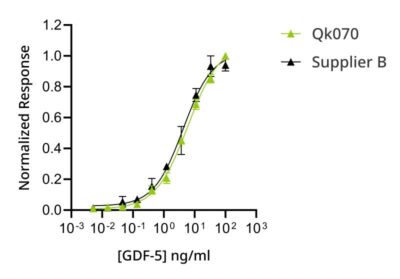
Qkine human growth differentiation factor 5 (GDF-5, Qk070) bioactivity is comparable to an alternative supplier protein
Recombinant human GDF-5 protein is commonly used for the differentiation and maintenance of induced pluripotent stem cells, embryonic stem cells, or bone marrow-derived mesenchymal stem cells into osteoblasts and chondrocytes. Qkine GDF-5 (Qk070) had equivalent bioactivity to GDF-5 from an alternative major supplier.
GDNF
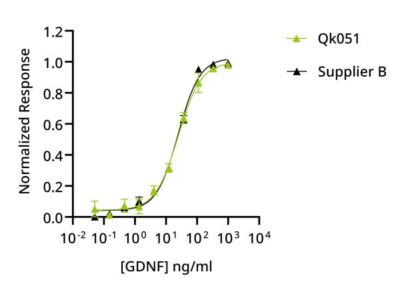
Qkine human glial cell line-derived neurotrophic factor (GDNF, Qk051) bioactivity is comparable to an alternative supplier protein
GNDF is used to maintain neurons and cortical organoids and to differentiate dopaminergic neurons from human pluripotent stem cell-derived neural progenitors. GDNF also facilitates the differentiation of neural progenitors to astrocytes. Qkine GDNF (Qk051) had equivalent bioactivity to GDNF from an alternative major supplier.
GM-CSF

Qkine Granulocyte Macrophage Colony-Stimulating Factor (GM-CSF, Qk076) is as biologically active as the comparable alternative supplier protein
GM-CSF is commonly used in cell culture to stimulate the differentiation and maturation of human induced pluripotent stem cells or peripheral blood cells to myeloid lineages. Qkine GM-CSF (Qk076) had equivalent bioactivity to GM-CSF from an alternative major supplier.
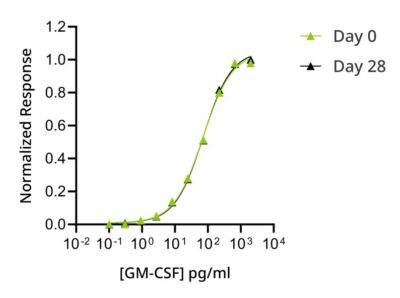
Qkine Granulocyte Macrophage Colony-Stimulating Factor (GM-CSF, Qk076) is stable and bioactive up to 28 days in cell culture conditions
GM-CSF is commonly used in cell culture to stimulate the differentiation and maturation of human induced pluripotent stem cells or peripheral blood cells to myeloid lineages. Qkine GM-CSF (Qk076) was found to bioactive after 28 days in media under cell culture conditions.
IGF-2
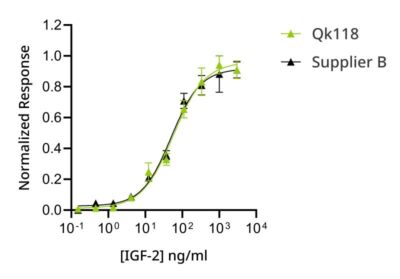
Qkine Insulin-like Growth Factor 2 (IGF-2, Qk118) is as biologically active as a comparable alternative supplier protein
Insulin-like Growth Factor 2 (IGF-2) is a growth factor that promotes cell proliferation, differentiation, and survival, particularly during fetal development. IGF-2 also regulates tissue growth and muscle regeneration. Qkine IGF-2 (Qk118) has equivalent bioactivity to IGF-2 from an alternative major supplier.
IL-1 beta
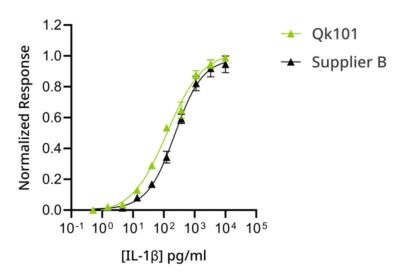
Qkine interleukin-1 beta (IL-1β, Qk101) is slightly more biologically active than a comparable alternative supplier protein
Recombinant human interleukin-1 beta (IL-1β) is a pro-inflammatory cytokine and a potent mediator of inflammation and immune responses. In cell culture, IL-1β is used to stimulate and activate immune cells (macrophages and T cells), maintain hematopoietic progenitor cells, and modulate the differentiation of mesenchymal stem cells. Qkine IL-1 beta (Qk101) was slightly more bioactive than IL-1 beta from an alternative major supplier.
IL-2
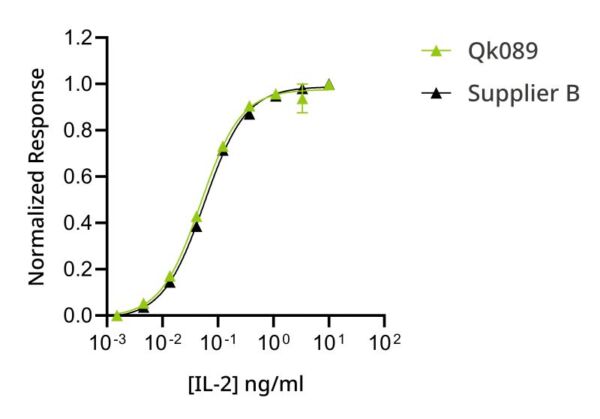
Qkine Interleukin 2 (IL-2, Qk089) is as biologically active as the comparable alternative supplier protein
Interleukin-2 (IL-2) is a vital cytokine that regulates immune responses by promoting the growth and activation of T-cells, enhancing immune function, and maintaining immune tolerance for immune activation and suppression. Qkine IL-2 (Qk089) has equivalent bioactivity to IL-2 from an alternative major supplier.
IL-3

Qkine Interleukin 3 (IL-3, Qk090) is as biologically active as the comparable alternative supplier protein
IL- 3 is commonly used in cell culture to stimulate the differentiation and maturation of human-induced pluripotent stem cells (iPSC) towards myeloid progenitors such as mast cells, basophils, neutrophils, eosinophils, monocytes, and megakaryocytes. Qkine IL-3 (Qk090) has equivalent bioactivity to IL-3 from an alternative major supplier.
IL-4

Qkine Interleukin 4 (IL-4, Qk092) is as biologically active as the comparable alternative supplier protein
Interleukin-4 (IL-4) is a pleiotropic, immune-modulatory cytokine that is secreted primarily by mast cells, T-cells, eosinophils, and basophils. IL-4 plays a crucial role in hematopoiesis, the regulation of antibody production, the stimulation of activated B cell and T cell proliferation, and the differentiation of B cells into plasma cells. Qkine IL-4 (Qk092) has equivalent bioactivity to IL-4 from an alternative major supplier.
IL-6
IL-7
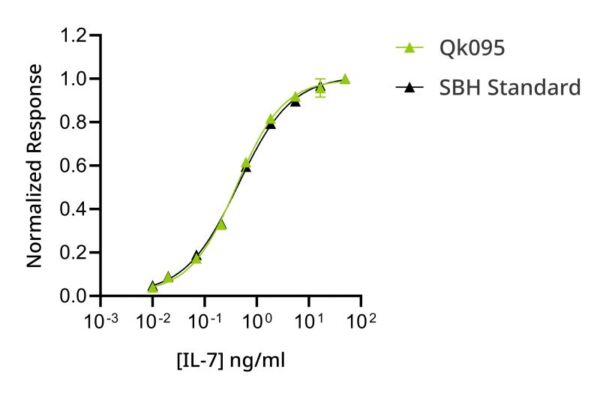
Qkine Interleukin-7 (IL-7, Qk095) is as biologically active as a comparable alternative supplier protein
Interleukin-7 (IL-7) is a vital cytokine essential for immune system regulation, particularly in the development and maintenance of T cells, playing a crucial role in both adaptive and innate immune responses. Recombinant human IL-7 stimulates the development of lymphoid progenitor cells. Qkine IL-7 (Qk095) was found to be as bioactive as IL-7 produced by an alternative supplier.
IFN-gamma
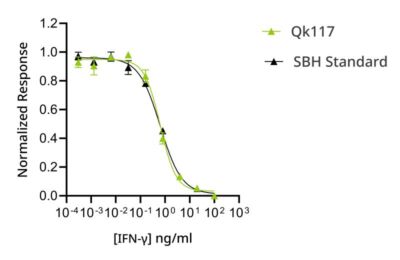
Qkine interferon-gamma (IFN-gamma, Qk117) is as biologically active as a comparable alternative standard protein
IFN-gamma (interferon-gamma) is a cytokine crucial for immune responses, produced by T cells and natural killer cells. It activates macrophages, enhances antigen presentation, and plays a key role in inflammation. Qkine IFN-gamma (Qk117) has equivalent bioactivity to the standard assay IFN-gamma.
LIF
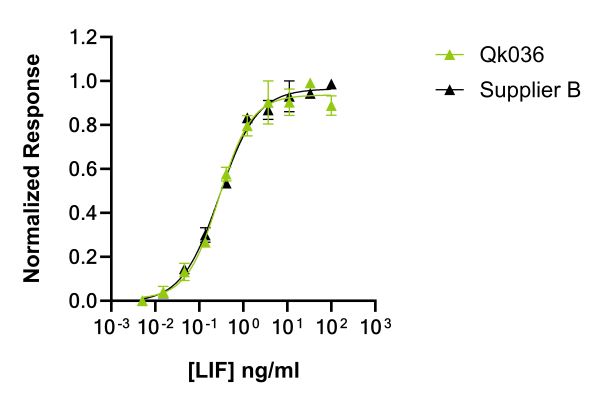
Qkine Leukemia Inhibitory Factor (LIF, Qk036) is as biologically active as a comparable alternative supplier protein
LIF is essential to maintain stem cell pluripotency, so it is widely used in embryonic and induced pluripotent stem cell cultures. Qkine LIF (Qk036) has equivalent bioactivity to LIF from an alternative major supplier.
M-CSF
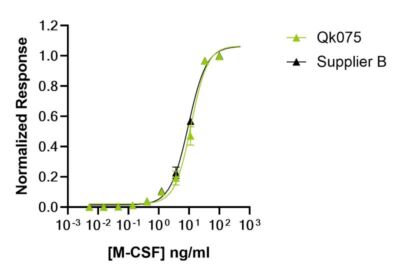
Qkine Macrophage Colony-Stimulating Factor (M-CSF, Qk075) is as biologically active as the comparable alternative supplier protein
M-CSF has been used in vitro for the differentiation of human induced pluripotent stem cell (iPSC)-derived macrophages as well as the maintenance and development of monocytes in hematopoietic stem cell culture. M-CSF has also been used to influence macrophage polarization towards an anti-inflammatory or M2 macrophage phenotype. Qkine M-CSF (Qk075) had equivalent bioactivity to M-CSF from an alternative major supplier.
Noggin
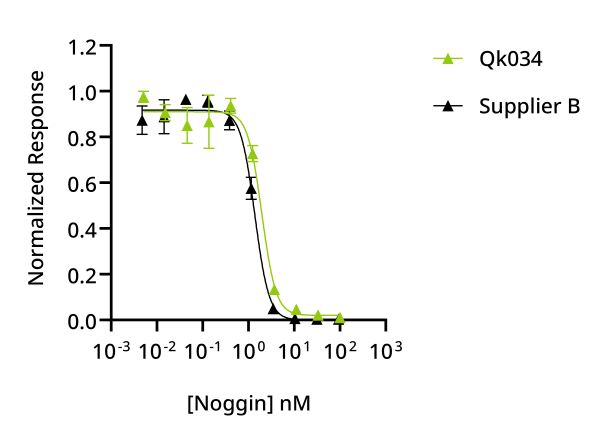
Qkine recombinant human noggin (Qk034) is as biologically active as a comparable alternative supplier protein
Noggin is used in the culture of embryonic and pluripotent stem cells and to derive neural and microglial lineages. It can also be used to generate intestinal, pancreatic, lung, and tumor-derived organoids. Qkine noggin (Qk034) has comparable bioactivity to noggin from an alternative major supplier.
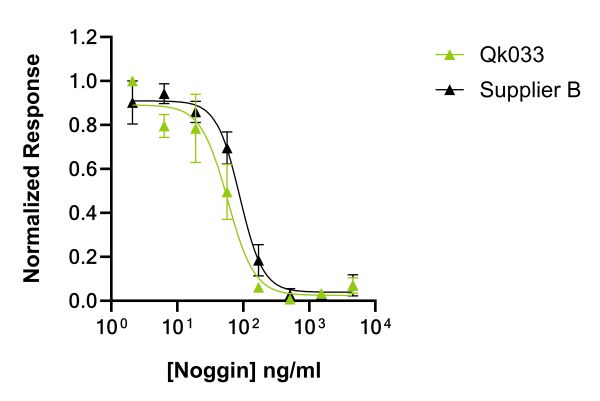
Qkine mouse/rat noggin (Qk033) is as biologically active as a comparable alternative supplier protein
Species-specific recombinant proteins such as mouse/rat noggin (Qk033) are essential for the culture of mouse and rat embryonic stem cells, ensuring reproducible and physiologically relevant cell cultures. Qkine mouse/rat noggin has comparable bioactivity to noggin from an alternative major supplier.
NT-3

Qkine neurotrophin 3 (NT3, Qk058) is as biologically active as a comparable alternative supplier protein
Neurotrophin 3 (NT-3) protein is used in cell culture to promote the differentiation and survival of specific neural subpopulations in both the central nervous system and peripheral nervous system such as sensory neurons, cortical neurons, and oligodendrocytes. Qkine NT-3 (Qk058) was as biologically active as a comparable alternative supplier protein.
PDGF
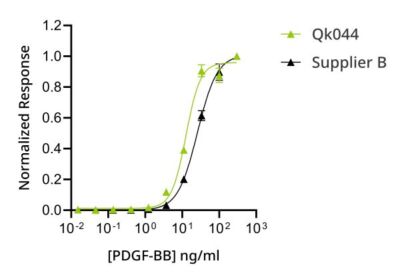
Qkine platelet derived growth factor BB (PDGF-BB, Qk044) is more biologically active than a comparable alternative supplier protein
Platelet derived growth factor BB (PDGF-BB) increases stem cell proliferation and marker expression and can be used in osteogenic and neural stem cell differentiation. Qkine PDGF-BB (Qk044) is more biologically active than a comparable alternative supplier protein.
R-spondin
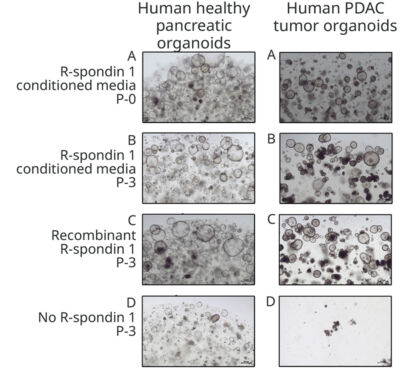
Recombinant R-spondin 1 (Qk006) can replace R-spondin 1 conditioned media in pancreatic organoid culture
Human R-spondin 1 protein (RSPO1) is the prototypic member of the R-spondin family. R-spondin 1 is used to potentiate Wnt signaling in many organoid culture systems. Qkine recombinant R-spondin 1 protein (Qk006) was found to be comparable to Wnti-3a conditioned media in supporting the growth of pancreatic organoids and PDAC tumor organoids.
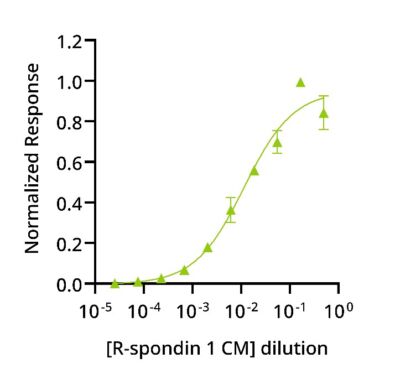
Comparison of recombinant human R-spondin 1 bioactivity (Qk006) to CSC1 R-spondin 1 conditioned media bioactivity
R-spondin 1 is used to potentiate Wnt signaling in many organoid culture systems. Conditioned media from R-spondin 1 expressing cell lines is a common source of R-spondin 1, however, conditioned media is a major source of intra- and inter-lab variability. Recombinant proteins can provide a low variability alternative to conditioned media. This technote describes the comparison of bioactivity between Qkine recombinant R-spondin 1 (Qk006) and R-spondin 1- conditioned media from the Cambridge Stem Cell Institute (CSCI).
SCF

Qkine Stem Cell Factor (SCF, Qk078) is as biologically active as a comparable alternative supplier protein
Stem cell factor (SCF) is a key myeloid progenitor differentiation factor for a variety of myeloid cells such as megakaryocytes, basophils, neutrophils, and monocytes. Qkine SCF (Qk078) has equivalent bioactivity to SCF from an alternative major supplier for simple cytokine substitution.
TGF-β
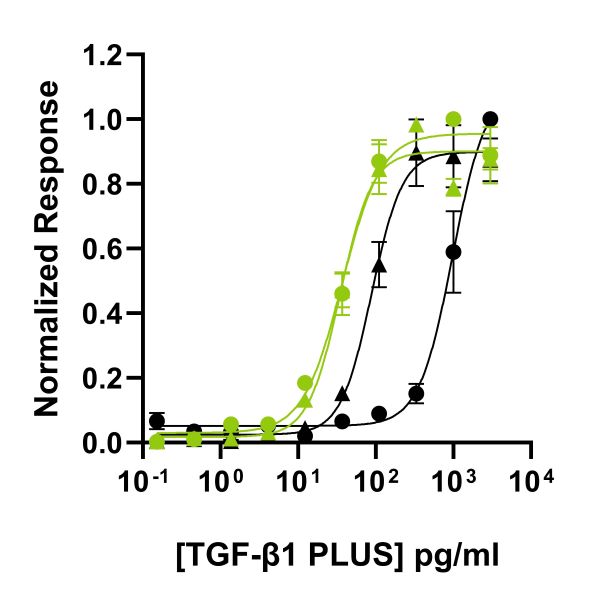
Qkine animal origin-free TGF-β1 PLUS (Qk010) is more bioactive than mammalian expressed alternatives
Transforming growth factor beta-1 (TGF-β1) is a common component of human pluripotency maintenance media. However, as TGF-β1 is a highly complex protein, it is difficult to manufacture in microbial expression systems. TGF-β1 PLUS shows exceptional lot-to-lot consistency, providing a reliable source of highly active TGF-β1. Qkine animal origin-free TGF-β1 PLUS was more bioactive than mammalian expressed alternative.

Qkine transforming growth factor beta-3 (TGF-β3, Qk054) is as biologically active as a comparable alternative supplier protein
TGF-β3 maintains the pluripotency of embryonic stem cells (ESC) and induced pluripotent stem cells (iPSC). It can also induce the differentiation of cartilage and muscle cells. Qkine TGF-β3 (Qk054) has equivalent bioactivity to TGF-β3 from an alternative major supplier.

The first quality-matched animal origin-free TGF–β1 (Qk010), TGF–β2 (Qk072) and TGF–β3 (Qk054) proteins for improved stem cell culture
Recombinant TGF-β proteins are essential reagents in most adult stem cell culture media, although it is not always clear which TGF-β is most appropriate to use. Qkine produces high-quality, animal origin-free TGF-β proteins with guaranteed equivalent purity, allowing comparison of all three directly to define the form that is most efficacious for a specific application.
VEGF
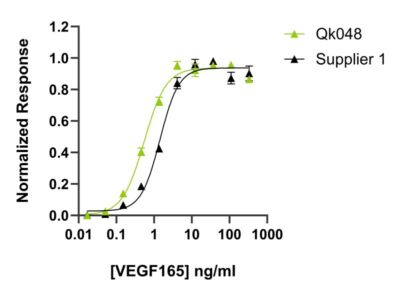
Qkine vascular endothelial growth factor isoform 165 (VEGF165, Qk048) is more biologically active than a comparable alternative supplier protein
VEGF165 is commonly used with human-induced pluripotent stem cells or embryonic stem cells-derived endothelial cells for developing human vascular tissue models. It has many applications including its use in neural research involving oligodendrocyte precursor cells, Schwann cells, astrocytes, and microglia. Qkine VEGF165 (Qk048) is more biologically active than a comparable alternative supplier protein.

